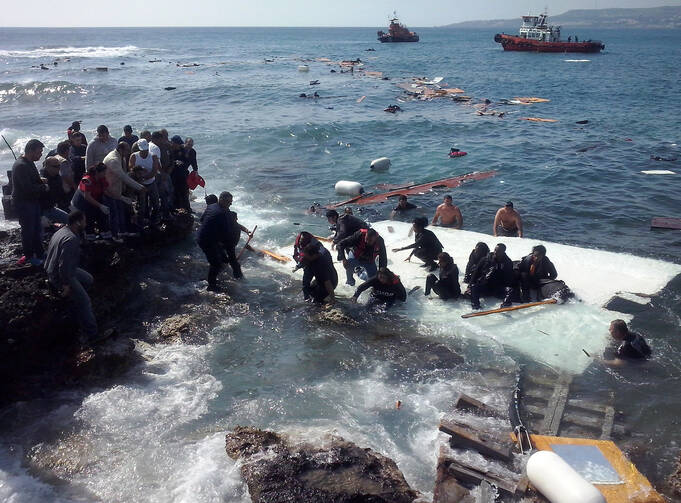Responses to the horrific loss of life in the southern Mediterranean on Saturday night have focussed, not only on the tragedy but also on the pressing need for the European Union to act. As many as 700 people drowned in this latest awful incident. The European office of JRS (Jesuit Refugee Service) tweeted: “2015: 35,000 refugees & migrants have arrived by boat in southern Europe. Some 1,600 are dead or missing.” Reports have since come in of another desperate group of migrants shipwrecked, but rescued, on the Greek island of Rhodes.
This latest calamity further deepens a crisis which has been worsening for some time. U.N. figures have it that as many as 3,500 migrants drowned attempting the crossing in 2014. Yet, with a little less than a third of 2015 gone, this most recent tragedy brings the number of fatalities already up to around 1,600. The “sailing season” is just beginning; large numbers of would-be migrants, mostly in the hands of people-traffickers, are thought to be about to attempt the crossing.
Pope Francis responded, with passion. At his regular Sunday lunchtime address to the thousands of pilgrims in St.Peter’s Square in Rome, Francis spoke of the migrants as “men and women like us, our brothers seeking a better life, starving, persecuted, wounded, exploited, victims of war. They were looking for a better life.” He continued, “I make a heartfelt appeal to the international community to react decisively and quickly to see to it that such tragedies are not repeated.”
The pontiff had spoken out in similar terms on Saturday, after a meeting with the new Italian president, Sergio Mattarella, at the Vatican. “We must not tire in our attempts to solicit a more extensive response at the European and international level,” he demanded.
Speaking for the Catholic Bishops Conference of England and Wales, Bishop Patrick Lynch urged E.U. countries to do more to assist in the rescue operations and seek long term solutions to the crisis. A Cork-born Columban missionary who has been an auxiliary bishop in Southwark (south London) since 2006, Lynch, speaking in his capacity as Bishop for Migration in the Conference, called on all E.U. member states to “involve themselves in the relief efforts and to work collaboratively to find a swift, just, effective and compassionate solution to these humanitarian disasters."
It might turn out that the scale of this latest tragedy will finally spur action on the part of those who have the power to act. Late on Monday, the E.U. did respond with a 10-point plan designed to address the crisis. An E.U. spokesperson was cited by the BBC describing this as "strong reaction from the E.U. to the tragedies" that "shows a new sense of urgency and political will." Among the proposed measures are an increase in funding for the E.U.’s Frontex agency, which runs the rescue operations along with the Italian and Maltese services, and a risky-sounding “civilian and military” [sic] plan to destroy the people-smugglers’ vessels.
But the operative considerations remain primarily political, whereas the interventions of the Catholic church and other Christians are driven by humanitarian and ethical concerns. The consistent Catholic position, shared with most NGOs, is that a rich continent has a moral duty to help and protect the vulnerable no matter their provenance. EU national governments shy away from humanitarian and altruistic arguments, fearing rising instability as populist anti-immigration politicians attract increasing support.
One view frequently cited is that an increase in search-and-rescue operations would serve only to encourage more migrants to risk the crossing. In the current U.K. parliamentary election campaign, to cite just one of several topical European examples, immigration from Europe is a significant and frequent row. Were any party to propose an increase in Britain’s paltry take of refugees from the Mediterranean, be they boat-people or directly-resettled refugees from, for example, Syria, it would be at that party’s electoral peril, or so runs the narrative. Free movement of all people within the European Union is a fact. Solidarity and compassion are not yet evident in governmental responses, for whom (as the English Catholic aid agency CAFOD expressed it today) protecting borders looks more important than protecting lives.
David Stewart, S.J., is America's London Correspondent.








